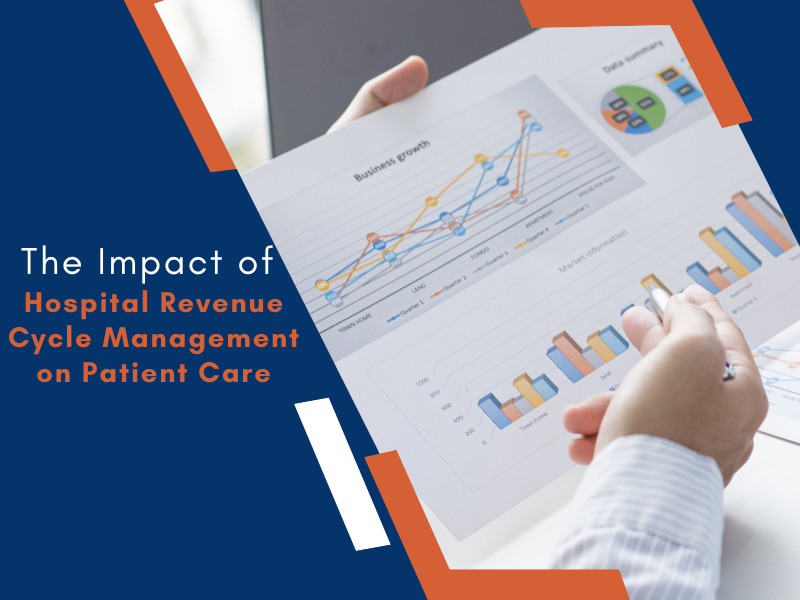In today’s healthcare landscape, patient care and hospital revenue cycle management (RCM) are intrinsically connected. Efficient hospital RCM systems ensure that medical providers maintain financial stability while prioritizing quality patient care. This blog explores how hospital revenue cycle management directly impacts patient experiences, care outcomes, and the overall success of healthcare organizations.
Understanding Hospital Revenue Cycle Management
Hospital revenue cycle management encompasses the financial processes involved in delivering healthcare services, from patient registration to final billing and payments. The key stages of hospital RCM include:
- Patient Scheduling and Registration: Collecting accurate insurance and demographic information.
- Claims Submission and Processing: Ensuring clean claims for timely reimbursement.
- Payment Posting and Collections: Handling patient payments and outstanding balances.
- Revenue Analytics and Reporting: Using insights to improve efficiency and minimize losses.
A well-optimized RCM system is not only critical for a hospital’s bottom line but also for enhancing patient satisfaction.
The Link Between RCM and Patient Care
1. Reducing Administrative Errors
Administrative inefficiencies, such as incorrect billing codes or insurance verification mistakes, can lead to claim denials or delays in patient care. With an efficient hospital revenue cycle management system, hospitals can minimize errors, ensuring smoother processes for patients and staff. Patients experience fewer interruptions in care, fostering trust in the healthcare provider.
2. Enhancing Access to Care
When hospitals efficiently manage their revenue cycles, they free up resources to invest in state-of-the-art medical equipment, staffing, and new treatment facilities. This directly improves patient access to timely and quality care, especially in underserved communities.
3. Improving Financial Transparency
Billing complexities can often leave patients confused or frustrated. Transparent billing practices, enabled by robust RCM systems, empower patients to understand their financial responsibilities upfront. Clear communication about costs fosters patient satisfaction and reduces disputes.
4. Streamlining Patient Experiences
From registration to discharge, seamless administrative processes play a pivotal role in shaping a patient’s experience. Efficient RCM reduces waiting times, avoids redundant paperwork, and ensures that care delivery is patient-focused.
How RCM Influences Patient Satisfaction
Fewer Payment Disputes
Payment disputes can strain the relationship between patients and providers. By ensuring accurate billing and timely claim resolutions, hospital RCM systems reduce the likelihood of misunderstandings, allowing patients to focus on recovery rather than financial concerns.
Accessible Payment Options
Modern RCM systems often integrate flexible payment plans and online portals, giving patients greater control over their medical expenses. These tools not only ease financial burdens but also strengthen patient trust in the hospital’s commitment to their well-being.
Focus on Patient-Centered Care
By automating routine administrative tasks, RCM solutions free healthcare providers to dedicate more time and attention to patients. This shift from administrative burdens to patient-centered care results in higher satisfaction and improved outcomes.
Challenges in Hospital Revenue Cycle Management
Despite its benefits, managing the hospital revenue cycle comes with challenges, including:
- Claim Denials: Insurance rejections often delay payment and care delivery.
- Compliance Issues: Staying updated with healthcare regulations can be daunting.
- Rising Patient Expectations: Patients demand transparency and convenience in all aspects of their care, including billing.
- Integration of Technology: Implementing and maintaining advanced RCM systems require significant investment and expertise.
Hospitals must address these challenges to ensure that their RCM practices positively impact patient care.
Technology’s Role in Transforming RCM and Patient Care
1. Automation
Automation reduces manual errors and speeds up processes like insurance verification and claims submission. This ensures faster patient admissions and timely treatments.
2. Data Analytics
Data-driven insights help hospitals predict trends, manage resources effectively, and identify areas for improvement in both financial and patient care outcomes.
3. Patient Portals
Digital tools such as patient portals allow patients to access billing information, make payments, and schedule appointments conveniently, enhancing their overall experience.
4. AI-Powered Assistance
Artificial intelligence can predict claim denials, identify billing errors, and recommend corrective actions, ensuring smoother financial operations and uninterrupted patient care.
Benefits of Effective Hospital RCM
Financial Stability
Efficient RCM ensures consistent cash flow, enabling hospitals to invest in infrastructure, technology, and personnel that directly benefit patients.
Better Patient Retention
Satisfied patients are more likely to return for future care and recommend the hospital to others.
Regulatory Compliance
Robust RCM practices keep hospitals compliant with ever-changing healthcare regulations, protecting them from legal and financial risks.
Case in Point: Hospitals with Optimized RCM Systems
Several hospitals that prioritize their RCM processes have reported improvements in patient satisfaction and financial outcomes. For example:
- Hospitals implementing automated claims management tools experienced a 40% reduction in claim denials.
- Patient satisfaction scores increased significantly in facilities that adopted transparent billing practices and flexible payment options.
These examples demonstrate the transformative potential of hospital revenue cycle management on healthcare delivery.
Steps to Optimize RCM for Better Patient Care
- Invest in Training: Equip staff with the knowledge to handle complex billing scenarios effectively.
- Adopt Advanced RCM Solutions: Use technology to streamline operations and enhance accuracy.
- Focus on Patient Communication: Ensure clear and compassionate communication regarding billing and insurance processes.
- Monitor Key Metrics: Regularly track performance indicators like claim denial rates and patient satisfaction scores to identify improvement areas.
- Collaborate with Experts: Partnering with specialized RCM providers can help hospitals overcome operational challenges and focus on their core mission of patient care.
Why Patient-Centered RCM Matters in Today’s Healthcare
In the modern healthcare environment, patients expect more than just medical expertise; they demand convenience, transparency, and empathy throughout their healthcare journey. An optimized RCM system allows hospitals to meet these expectations by:
- Ensuring timely and uninterrupted care.
- Reducing financial stress for patients.
- Building trust through transparent and accurate billing practices.
Hospitals that prioritize patient-centered RCM are better positioned to thrive in a competitive healthcare landscape.
Partnering with Apaana Healthcare for Excellence
Hospital revenue cycle management is a cornerstone of both financial health and patient satisfaction. As hospitals strive to balance these priorities, partnering with experts in the field can make all the difference.
Apaana Healthcare is your trusted ally in achieving operational excellence. We specialize in global healthcare management solutions, offering services such as member enrollment, claims administration, medical billing & coding, and provider engagement.
Our expertise ensures that your hospital’s revenue cycle management processes are streamlined, cost-effective, and aligned with your mission to deliver exceptional patient care. By outsourcing to Apaana Healthcare, you can focus on what matters most – your patients—while we handle the complexities of your financial operations.
Conclusion
The impact of hospital revenue cycle management on patient care cannot be overstated. An efficient RCM system not only secures a hospital’s financial stability but also enhances the patient experience, builds trust, and improves health outcomes.
As the healthcare industry continues to evolve, hospitals must embrace innovative RCM practices to meet the demands of modern patients. By partnering with Apaana Healthcare, your hospital can achieve seamless revenue cycle management, allowing you to focus on delivering compassionate and high-quality care.
Let Apaana Healthcare help you transform your RCM processes and elevate your patient care standards today.





